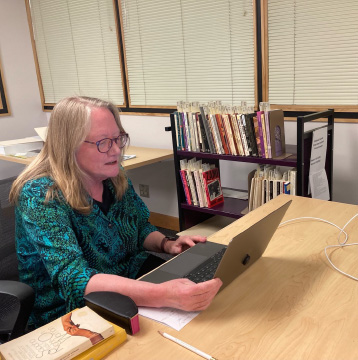Many of today’s advances toward gender equality are the result of second-wave feminism, a 25-year-long movement that revolutionized the lives of women and members of the LGBTQ+ community.
Shane Snowdon, a second-wave feminist and the 2022 recipient of the Colorado State University Libraries’ Friedman Feminist Press Collection research grant, will study how the movement’s writing “personalized the political” and reflected unprecedented, intensely personal accounts of women on its front lines.
“With the Friedman Collection, we can gather on three shelves the books that changed the world,” Snowdon said. Being involved in “second-wave feminism changed my life and many others; there aren’t many places where you can see the books that did that.”
Despite its vital role in supporting activists, much of the second wave’s writing has fallen into “undeserved obscurity” — a trend that Snowdon believes the Friedman Collection can help reverse.

Shane Snowdon is the winner of the CSU Libraries’ Friedman Feminist Press Collection research grant, and had the opportunity to visit Fort Collins and study the materials.
Perhaps the best-known book of the movement is Betty Friedan’s 1963 publication The Feminine Mystique, which critiqued how social norms pushed women into the home and helped millions of women recognize sexism in their personal lives. Some influential second wave writing, like Friedan’s, was embraced by mainstream publishers and remains readily accessible today.
Other writing is not.
“Much of the most powerful writing of that era, especially by lesbians, was rejected by mainstream publishers and bookstores, who considered it unmarketable, too radical, or both,” Snowdon said.
To overcome this resistance, a rich network of independent feminist presses, bookstores and periodicals emerged in the 1970s. Snowdon herself was part of this network as editor of the national feminist journal Sojourner, one of the longest-running feminist publications in history.
“Our network lasted through the early 21st century,” she said. “But when much better-resourced mainstream publishers and stores became more open to feminist writing, the network mostly vanished— and so did most of its titles.”
According to Snowdon, the Friedman Collection is one of the very few places where these transformative titles live on.
“That writing literally sustained feminists, particularly lesbians, in a world almost impossible to imagine today,” she said. “Women wrote openly for the very first time about surviving abuse and assault, facing racism and classism, loving other women, approaching sex and parenting differently, and much more.”
The CSU Libraries’ Friedman Collection reflects some of the first writings on these topics, and it counts the first appearances of Audre Lorde and Adrienne Rich in print among its groundbreaking accounts.
“In second-wave feminism, writing was everything,” Snowdon said. “These are books that maintained, inspired and supported us – and transformed writing in the U.S.”
After delving into the collection, Snowdon realized just how revolutionary these books were.
“A lot of post-second wave people would be surprised and delighted to see how fiercely this writing critiqued gender and sexuality norms in a time when that was rare and even dangerous,” she said. “I think it’s always inspiring to read the words of people who challenged and changed oppressive beliefs against huge odds.”
She said she ended her visit “determined to do everything I can to bring this writing to younger people, particularly before the women involved in it die.”
In this effort, Snowdon plans to draw on her experiences heading the women’s center at the University of California Santa Cruz, founding the LGBTQ center at the University of California San Francisco and teaching gender and sexuality at the university level.
“I’ve already had fantastic conversations with younger folks who had no idea this amazing writing existed, or how hard it was to get out into the world — they want more people to know the writing, the women, the story,” she said.
Second-wave feminists often didn’t see themselves as writers and wanted to share the unflinching truths of their personal lives and change the world. Snowdon said the Friedman Collection “offers a direct, rare, and precious opportunity to really get to know them – their brilliance, their flaws, their wit, their rage.”
Amid today’s intense political climate, second-wave feminism is often misunderstood, despite the immense progress it achieved.
The Friedman Collection, in going beyond mainstream-published writing, brings the second wave back to life, Snowdon said.
“This collection tells a story that’s incredibly engaging and important — no matter who or how old you are,” she said. “May it have the many visitors that these titles and their authors so deserve.”